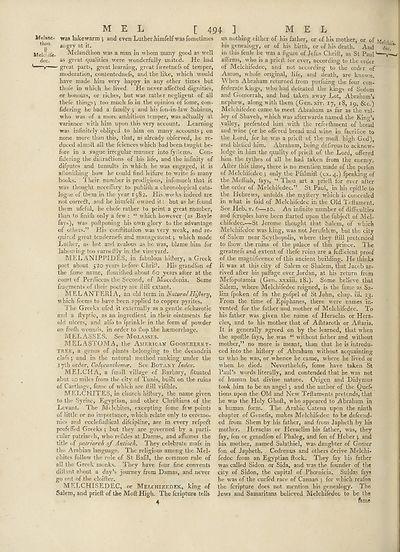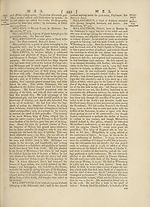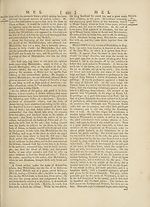Encyclopaedia Britannica, or, a Dictionary of arts, sciences, and miscellaneous literature : enlarged and improved. Illustrated with nearly six hundred engravings > Volume 13, MAT-MIC
(536) Page 494
Download files
Complete book:
Individual page:
Thumbnail gallery: Grid view | List view

MEL [ 494 ] MEL
Melanc- was lukewarm ; and even Luther himfelf was fometimes
t^°n angry at it.
Melci.ifc- Melanfthon was a man in whom many good as well
dec. as great qualities were wonderfully united. He had
l^""' »-*■ ■■ great parts, great learning, gro at fweetnefs of temper,
moderation, contentednefs, and the like, which would
have made him very happy in any other times but
thofe in which he lived. He never affefted dignities,
or honours, or riches, but was rather negligent of all
thele things j too much fo in the opinion of fome, con-
fidering he had a family ; and his fon-in-law Sabinus,
who was of a more ambitious temper, was actually at
variance with him upon this very account. Learning
was infinitely obliged to him on many accounts •, on
none more than this, that, as already obferved, he re¬
duced almolt all the fciences which had been taught be¬
fore in a vague irregular manner into fytlems. Con-
fiuering the dinraflions of his life, and the infinity of
difputes and tumults in which he was engaged, it is
afionilhing how he could find leifure to write fo many
books. Their number is prodigious, infomuch that it
was thought necefiary to publiih a chronological cata¬
log ie of them in the year 1582. His works indeed arc
not correft, and he himfelf owned it: but as he found
them ufeful, he chofe rather to print a great number,
than to finish only a few : “ which however (as Bayle
fays), was poftponing his own glory to the advantage
of others.” His conflitution was very Aveak, and re¬
quired great tendernefs and management ; Avhieh made
Luther, as hot and zealous as he was, blame him for
labt uring too earneftly in the vineyard.
MEL ANIPPIDES, in fabulous hitfory, a Greek
poet about 520 years before Chrill. His grandfon of
the fame name, flourilhed about 60 years after at the
court of Perdiccas the Second, of Macedonia. Some
fragments of their poetry are Hill extant.
MEL ANTER1A, an old term in NaturalHiJlonj,
which feems to have been applied to copper pyrites.
The Greeks ufed it externally as a gentle efcharotic
and a ilyptic, as an ingredient in their ointments for
old ulcers, and alfo to fprinkle in the form of powder
on frelh wounds, in order to Hop the haemorrhage.
MEL ASSES. See Molasses.
MELASTOMA, the American Gooseberry-
tree, a genus of plants belonging to the decandria
clafs 5 and in the natural method ranking under the
17th order. Caljcanthcmce. See Botany Index.
MELCHA, a fmall village of Barbary, fituated
abut io miles from the city of Tunis, built on the ruins
of Carthage, fome of which are Hill cdfible.
MELCHITES, in church hiftory, the name given
to the Syriac, Egyptian, and other Chriftians of the
Levant. The Melchites, excepting fome few points
of little or no importance, which relate only to ceremo¬
nies and ecelefiaftical difcipline, are in e\'ery refpedl
profelfed Greeks $ but they are governed by a parti¬
cular patriarch, who refides at Damas, and affumes the
title of patriarch of Antioch. They celebrate mafs in
the Arabian language. The religious among the Mel¬
chites follow the rule of St Bafil, the common rule of
all the Greek monks. They have four fine convents
diftant about a day’s journey from Damas, and never
go out of the cloifler.
MELCHISEDEC, or Meechizedek, king of
Salem, and prieft of the Moft High. The feripture tells
4
us nothing either of his father, or of his mother, or of
his genealogy, or of his birth, or of his death. And
in this fenfe he Avas a figure of Jefus Chrift, as St Paul
affirms, Avho is a prieit for ever, according to the order
of Melchifedec, and not according to the order of
Aaron, Avbofe original, life, and death, are known.
When Abraham returned from purfuing the four con¬
federate kings, Avho had defeated the kings of Sodom
and Gomorrah, and had taken array Lot, Abraham’s
nephew, along with them (Gen. xiv. 17, 18, 19, &c.)
Melchifedec came to meet Abraham as far as the val¬
ley of Shaveh, which rvas afterwards named the Kino’s
valley, prefen ted him rvith the refreffiment of bread
and wine (or he offered bread and wine in facrifice to
the Lord, for he Avas a prieft of the moft high God),
and bleii’ed him. Abraham, being defirous to aeknoAV-
ledge in him the quality of prieft of the Lord, oftered
him the tythes of all he had taken from the enemy.
After this time, there is no mention made of the perfon
of Melchifedec \ only the Pfalmift (cx. 4.) fpeaking of
the Meffiah, fays, “ Thou art a prieft for ever after
the order of Melchifedec.” St Paul, in his epiftle to
the Hebrews, unfolds the myftery which is concealed
in Avhat is faid of Melchifedec in the Old Teftament.
See Heb. v. 6—io. An infinite number of difficulties
and fcruples have been ftarted upon the fubjedl of Mel¬
chifedec.—St Jerome thought that Salem, of Avhich
Melchifedec Avas king, Avas not Jerufalem, but the city
of Sal cm near Scytbopolis, Avhere they ftill pretended
to flioAV the ruins of the palace of this prince. The
greatnefs and extent of thefe ruins are a fufficient proof
of the magnificence of this ancient building. He thinks
it Avas at this city of Salem or Shalem, that Jacob ar¬
rived after his palfage over Jordan, at his return from
Mefopotamia (Gen. xxxiii. 18.). Some believe that
Salem, Avhere Melchifedec reigned, is the fame as Sa¬
lim fpoken of in the gofpel of St John, chap. iii. 23.
From the time of Epiphanes, there were names in¬
vented for the father and mother of Melchifedec. To
his father was given the name of Heraclas or Hera¬
cles, and to his mother that of Aftitaroth or Afiaria.
It is generally agreed on by the learned, that Avhen
the apoftle fays, he aaus “ Avithout father and Avithout
mother,” no more is meant, than that he is introdu¬
ced into the hiftory of Abraham Avithout acquainting
us who he Avas, or whence he came, wftere he lived or
when he died. Neverthelefs, fome have taken St
Paul’s words literally, and contended that he Avas not
of human but divine nature. Origen and Didymus
took him to be an angel; and the author of the Quef-
tions upon the Old and Ncav Teftaments pretends, that
he was the Holy Ghoft, who appeared to Abraham in
a human form. The Arabic Catena upon the ninth
chapter of Genefis, makes Melchifedec to be defeend-
ed from Shem by his father, and from Japheth by his
mother. Heraclas or Heraclim his father, Avas, they
fay, fon or grandfon of Phaleg, and fon of Heber •, and
his mother, named Salathiel, Avas daughter of Gomer
fon of Japheth. Cedrenus and others derive Melchi¬
fedec from an Egyptian ftock. They fay his father
Avas called Sidon or Sida, and Avas the founder of the
city of Sidon, the capital of Phoenicia. Suidas fays
he Avas of the curfed race of Canaan 5 for Avhich reafon
the feripture does not mention his genealogy. The
Jews and Samaritans believed Melchifedec to be the
feme
Melanc- was lukewarm ; and even Luther himfelf was fometimes
t^°n angry at it.
Melci.ifc- Melanfthon was a man in whom many good as well
dec. as great qualities were wonderfully united. He had
l^""' »-*■ ■■ great parts, great learning, gro at fweetnefs of temper,
moderation, contentednefs, and the like, which would
have made him very happy in any other times but
thofe in which he lived. He never affefted dignities,
or honours, or riches, but was rather negligent of all
thele things j too much fo in the opinion of fome, con-
fidering he had a family ; and his fon-in-law Sabinus,
who was of a more ambitious temper, was actually at
variance with him upon this very account. Learning
was infinitely obliged to him on many accounts •, on
none more than this, that, as already obferved, he re¬
duced almolt all the fciences which had been taught be¬
fore in a vague irregular manner into fytlems. Con-
fiuering the dinraflions of his life, and the infinity of
difputes and tumults in which he was engaged, it is
afionilhing how he could find leifure to write fo many
books. Their number is prodigious, infomuch that it
was thought necefiary to publiih a chronological cata¬
log ie of them in the year 1582. His works indeed arc
not correft, and he himfelf owned it: but as he found
them ufeful, he chofe rather to print a great number,
than to finish only a few : “ which however (as Bayle
fays), was poftponing his own glory to the advantage
of others.” His conflitution was very Aveak, and re¬
quired great tendernefs and management ; Avhieh made
Luther, as hot and zealous as he was, blame him for
labt uring too earneftly in the vineyard.
MEL ANIPPIDES, in fabulous hitfory, a Greek
poet about 520 years before Chrill. His grandfon of
the fame name, flourilhed about 60 years after at the
court of Perdiccas the Second, of Macedonia. Some
fragments of their poetry are Hill extant.
MEL ANTER1A, an old term in NaturalHiJlonj,
which feems to have been applied to copper pyrites.
The Greeks ufed it externally as a gentle efcharotic
and a ilyptic, as an ingredient in their ointments for
old ulcers, and alfo to fprinkle in the form of powder
on frelh wounds, in order to Hop the haemorrhage.
MEL ASSES. See Molasses.
MELASTOMA, the American Gooseberry-
tree, a genus of plants belonging to the decandria
clafs 5 and in the natural method ranking under the
17th order. Caljcanthcmce. See Botany Index.
MELCHA, a fmall village of Barbary, fituated
abut io miles from the city of Tunis, built on the ruins
of Carthage, fome of which are Hill cdfible.
MELCHITES, in church hiftory, the name given
to the Syriac, Egyptian, and other Chriftians of the
Levant. The Melchites, excepting fome few points
of little or no importance, which relate only to ceremo¬
nies and ecelefiaftical difcipline, are in e\'ery refpedl
profelfed Greeks $ but they are governed by a parti¬
cular patriarch, who refides at Damas, and affumes the
title of patriarch of Antioch. They celebrate mafs in
the Arabian language. The religious among the Mel¬
chites follow the rule of St Bafil, the common rule of
all the Greek monks. They have four fine convents
diftant about a day’s journey from Damas, and never
go out of the cloifler.
MELCHISEDEC, or Meechizedek, king of
Salem, and prieft of the Moft High. The feripture tells
4
us nothing either of his father, or of his mother, or of
his genealogy, or of his birth, or of his death. And
in this fenfe he Avas a figure of Jefus Chrift, as St Paul
affirms, Avho is a prieit for ever, according to the order
of Melchifedec, and not according to the order of
Aaron, Avbofe original, life, and death, are known.
When Abraham returned from purfuing the four con¬
federate kings, Avho had defeated the kings of Sodom
and Gomorrah, and had taken array Lot, Abraham’s
nephew, along with them (Gen. xiv. 17, 18, 19, &c.)
Melchifedec came to meet Abraham as far as the val¬
ley of Shaveh, which rvas afterwards named the Kino’s
valley, prefen ted him rvith the refreffiment of bread
and wine (or he offered bread and wine in facrifice to
the Lord, for he Avas a prieft of the moft high God),
and bleii’ed him. Abraham, being defirous to aeknoAV-
ledge in him the quality of prieft of the Lord, oftered
him the tythes of all he had taken from the enemy.
After this time, there is no mention made of the perfon
of Melchifedec \ only the Pfalmift (cx. 4.) fpeaking of
the Meffiah, fays, “ Thou art a prieft for ever after
the order of Melchifedec.” St Paul, in his epiftle to
the Hebrews, unfolds the myftery which is concealed
in Avhat is faid of Melchifedec in the Old Teftament.
See Heb. v. 6—io. An infinite number of difficulties
and fcruples have been ftarted upon the fubjedl of Mel¬
chifedec.—St Jerome thought that Salem, of Avhich
Melchifedec Avas king, Avas not Jerufalem, but the city
of Sal cm near Scytbopolis, Avhere they ftill pretended
to flioAV the ruins of the palace of this prince. The
greatnefs and extent of thefe ruins are a fufficient proof
of the magnificence of this ancient building. He thinks
it Avas at this city of Salem or Shalem, that Jacob ar¬
rived after his palfage over Jordan, at his return from
Mefopotamia (Gen. xxxiii. 18.). Some believe that
Salem, Avhere Melchifedec reigned, is the fame as Sa¬
lim fpoken of in the gofpel of St John, chap. iii. 23.
From the time of Epiphanes, there were names in¬
vented for the father and mother of Melchifedec. To
his father was given the name of Heraclas or Hera¬
cles, and to his mother that of Aftitaroth or Afiaria.
It is generally agreed on by the learned, that Avhen
the apoftle fays, he aaus “ Avithout father and Avithout
mother,” no more is meant, than that he is introdu¬
ced into the hiftory of Abraham Avithout acquainting
us who he Avas, or whence he came, wftere he lived or
when he died. Neverthelefs, fome have taken St
Paul’s words literally, and contended that he Avas not
of human but divine nature. Origen and Didymus
took him to be an angel; and the author of the Quef-
tions upon the Old and Ncav Teftaments pretends, that
he was the Holy Ghoft, who appeared to Abraham in
a human form. The Arabic Catena upon the ninth
chapter of Genefis, makes Melchifedec to be defeend-
ed from Shem by his father, and from Japheth by his
mother. Heraclas or Heraclim his father, Avas, they
fay, fon or grandfon of Phaleg, and fon of Heber •, and
his mother, named Salathiel, Avas daughter of Gomer
fon of Japheth. Cedrenus and others derive Melchi¬
fedec from an Egyptian ftock. They fay his father
Avas called Sidon or Sida, and Avas the founder of the
city of Sidon, the capital of Phoenicia. Suidas fays
he Avas of the curfed race of Canaan 5 for Avhich reafon
the feripture does not mention his genealogy. The
Jews and Samaritans believed Melchifedec to be the
feme
Set display mode to:
![]() Universal Viewer |
Universal Viewer | ![]() Mirador |
Large image | Transcription
Mirador |
Large image | Transcription
Images and transcriptions on this page, including medium image downloads, may be used under the Creative Commons Attribution 4.0 International Licence unless otherwise stated. ![]()
| Permanent URL | https://digital.nls.uk/192668130 |
|---|
| Attribution and copyright: |
|
|---|
| Description | Ten editions of 'Encyclopaedia Britannica', issued from 1768-1903, in 231 volumes. Originally issued in 100 weekly parts (3 volumes) between 1768 and 1771 by publishers: Colin Macfarquhar and Andrew Bell (Edinburgh); editor: William Smellie: engraver: Andrew Bell. Expanded editions in the 19th century featured more volumes and contributions from leading experts in their fields. Managed and published in Edinburgh up to the 9th edition (25 volumes, from 1875-1889); the 10th edition (1902-1903) re-issued the 9th edition, with 11 supplementary volumes. |
|---|---|
| Additional NLS resources: |
|

